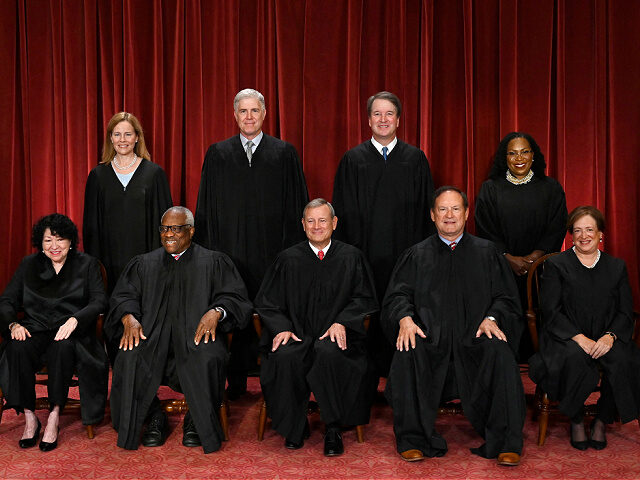The Supreme Court ruled in a 5-4 opinion against three illegal aliens fighting their deportation orders from the United States, claiming they did not receive proper notice of their removal hearings in federal immigration court.
When illegal aliens Esmelis Campos-Chaves, Varinder Singh, and Raul Daniel Mendez-Colín failed to appear before federal immigration judges, they were ordered deported in absentia. In each case, the Department of Justice (DOJ) sent initial Notices to Appear (NTA) in immigration court that did not specify the time and place of the hearings.
Later, though, the DOJ sent notices of hearings to each of the illegal aliens which included the time and place for when they needed to appear before a federal immigration judge. In each case, though, the men did not appear at their court hearings and were ordered deported from the United States in absentia.
Each illegal alien then moved to have their deportation orders rescinded, claiming the DOJ did not sufficiently notify them of their immigration hearings. The Fifth Circuit denied one of the petitions while the Ninth Circuit sided with the other two illegal aliens.
On Friday, Justice Samuel Alito wrote for the majority, finding that the DOJ did provide proper notice of immigration hearings to each of the illegal aliens, and thus they cannot seek rescission of their deportation orders:
Campos-Chaves, Singh, and Mendez-Colín all received “notice in accordance with paragraph (1) or (2)” for the hearings they missed, and thus their in absentia removal orders may not be rescinded on that ground. The Government concedes that none of them received a compliant NTA. Each did, however, receive a “notice in accordance with paragraph . . . (2),” and each notice met all of the requirements for a notice under that provision. After receiving a defective NTA, each alien received a notice that provided a specific time and place for their removal proceedings. Those notices provided “new” times, and thereby “change[d]” the time and place of their removal proceedings, within the meaning of §1229(a)(2). [Emphasis added]
…
When the Government seeks to remove an alien, it is required to notify the alien of the time and place of the removal hearings. Title 8 U. S. C. §1229(a) describes two types of notice—an initial notice to appear under paragraph (1), and, “in the case of any change or postponement in the time and place of ” the removal proceedings, a notice of hearing under paragraph (2). When an alien fails to appear at his removal hearing despite receiving such notice, he “shall be ordered removed in absentia” if the Government can make certain showings. §1229a(b)(5)(A). The alien can seek to have that order rescinded, however, if the alien can demonstrate that he “did not receive notice in accordance with paragraph (1) or (2) of [§1229(a)].” [Emphasis added]
We granted certiorari in these cases to consider what it means to “demonstrat[e] that the alien did not receive notice in accordance with paragraph (1) or (2).” §1229a(b) (5)(C)(ii); 600 U. S. ___ (2023). Each of the aliens in these cases argues that he may seek rescission because he did not receive a notice to appear that complies with paragraph (1). We hold that, to rescind an in absentia removal order on the ground that the alien “did not receive notice in accordance with paragraph (1) or (2),” the alien must show that he did not receive notice under either paragraph for the hearing at which the alien was absent and ordered removed. Because each of the aliens in these cases received a proper paragraph (2) notice for the hearings they missed and at which they were ordered removed, they cannot seek rescission of their in absentia removal orders on the basis of defective notice under §1229a(b)(5)(C)(ii). [Emphasis added]
Alito was joined by Chief Justice John Roberts as well as Justices Thomas, Kavanaugh, and Barrett. Justice Jackson filed a dissenting opinion, joined by Justices Sotomayor, Kagan, and Gorsuch.
The case is Campos-Chaves v. Garland, No. 22-674 in the Supreme Court of the United States.
John Binder is a reporter for Breitbart News. Email him at jbinder@breitbart.com. Follow him on Twitter here.

COMMENTS
Please let us know if you're having issues with commenting.